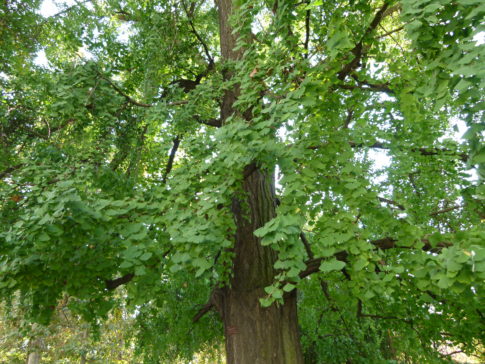
Ginkgo biloba has been traced back nearly 300 million years, making it the oldest surviving tree species on earth. The Chinese have used the plant medicinally for eons, but many of the modern applications come from the research of German scientists. Ginkgo is a prescription herb in Germany. Personally, I am using the fresh leaves in spring, which are containing the full life force of the Ginkgo tree and would not want to take a drug, containing all those additives. Ginkgo trees can get way over 1000 years old.
Articles in full down below:
- Ginkgo biloba promotes better blood flow and a healthy brain
- Ginkgo biloba treats Alzheimer’s symptoms and improves mental function in healthy individuals
- Ginkgo Biloba
- This Buddhist temple’s 1,400-year-old ginkgo tree is dropping a sea of yellow
* * *
Twenty-fourth donation in 2016.
Infinite Unknown reader R.D. donated $25.
Thank you for your continuing support!
Very much needed and appreciated.
* * *
Donations in May: $55
Donations in April: $75, £25 $50,00 (CAD), $10 (AUD)
Donations in March: $30, £25, $10 (AUD)
Donations in February: $245, £25
Donations in January: $85, £25
* * *
Donations in 2016: $490 £100, $50,00 (CAD), $20 (AUD)
* * *
PayPal: Donate in USD
PayPal: Donate in EUR
PayPal: Donate in GBP
PayPal: Donate in AUD
PayPal: Donate in CAD
PayPal: Donate in CHF
* * *
– Ginkgo biloba promotes better blood flow and a healthy brain:
Over a long period of time, ginkgo biloba has developed a well deserved reputation for its main health benefits associated with improved blood circulation in the body and especially in the brain. Many health practitioners have recognized the medicinal herb’s outstanding results when it comes to improving memory and overall brain functions. This explains why Europeans have often favoured using ginkgo biloba in order to treat ailments such as dementia.
The ginkgo leaves contain chemicals (flavonoids and terpenoids) that act as important antioxidants inhibiting the damage free radicals can cause from expanding within your body and cells, something that’s even more important as you age. By fighting off these particles, ginkgo biloba’s effects help prevent debilitating health conditions such as heart disease, cancer and Alzheimer’s disease.
This herb’s principal quality is its ability to increase and improve blood flow by dilating blood vessels, therefore its no surprise that various laboratory tests and animal studies showed that its flavonoids protect the nerves, heart muscle, blood vessels and retina from damage.
Studies about Alzheimer’s disease and general dementia have shown mixed results so far when compared with placebos, although more research needs to be done in order to validate ginkgo biloba’s true worth with such health problems. Up to now, it’s more important to note that it does improve thinking, learning and overall cognitive functions; plus it improves social behavior while also reducing feelings of depression.
Does ginkgo biloba’s effectiveness compare favourably to drugs for dementia treatment ?
Although there seems to be a lack of faith amongst the medical community in regards to ginkgo biloba’s ability to somewhat protect or at least improve on conditions of dementia, a study reported by the European Journal of Neurology showed that it can create neuroprotective effects with neurodegenerative diseases of multifactorial origin.
The study’s main purpose was to analyze ginkgo biloba’s efficacy in slowing down symptoms of dementia with patients suffering from Alzheimer’s disease. The clinical tests were conducted over a period of 24 weeks, placebo-controlled and randomized. The participants averaged between 50 and 80 years of age, all suffered from dementia but none of them were at an advanced stage. Three groups were formed, the first one was given daily doses of ginkgo biloba, the second, a daily dose of a drug called donepezil, while the last consisted of the placebo group.
The results recorded from this trial clearly showed that ginkgo biloba did display therapeutic effectiveness. The herb’s results were at the very least on par with the prescription drug used for this study. Needless to say, when faced with similar results, the medicinal herb always has the advantage of not leaving toxic by-products in the body, which is unfortunately what every drug does. As previously mentioned, more conclusive evidence from serious scientific research is needed in order to truly validate ginkgo biloba’s real potential.
Sources for this article include :
http://science.naturalnews.com
* * *
– Ginkgo biloba treats Alzheimer’s symptoms and improves mental function in healthy individuals:
The leaf of the Ginkgo biloba tree, also known as the Maidenhair tree, has been used around the world, particularly in Asia, for thousands of years to improve mental functions and treat other conditions. Native to China, this large tree, normally reaching heights of 20-35 meters, is a species with no close living relatives. Its unique extract remains a very poplar dietary supplement in the U.S. and around the world.
Smart drugs
Ginkgo biloba’s primary nootropic properties include enhanced memory and concentration. Of all nootropics, or “smart drugs” as they are sometimes called, ginkgo has established itself among the most relevant and studied available. Don’t let the term “drug” fool you; however, ginkgo is 100 percent natural.
Researchers are unsure exactly how ginkgo improves cognitive function but it is likely that the active substances act as re-uptake inhibitors of serotonin, dopamine and norepinephrine. Each of these neurotransmitters are important in regulating mood, energy levels, thought processes and mental function in general. Ginkgo leaves include flavonoid glycosides and terpenoids that posses strong antioxidant properties, which are also responsible for its nootropic effects and other health benefits.
Various studies have reported that ginkgo extract can vastly improve attention and memory in healthy persons. In fact, one of these studies concluded that the results of the supplement were almost immediate, with peak performance occurring two and a half hours after ingestion.
Ginkgo is also known to have other health benefits including improved eye health, reduced plaque buildup around artery walls, improved circulation and increased metabolism.
Alzheimer’s
Various studies and clinical trials have been conducted testing the efficacy of ginkgo as a treatment for Alzheimer’s disease. Although it can be difficult to quantify the effects of any form of treatment on a diseases like Alzheimer’s or dementia, ginkgo has proven to be useful. A 2010 meta-analysis of nine studies of ginkgo for treating dementia concluded it was more effective than a placebo. Furthermore, Mayo Clinic gives Ginkgo biloba an “A” rating for dementia, meaning there is strong scientific evidence for this application.
Ginkgo may also be effective in treating and improving other conditions including intermittent claudication, tinnitus, macular degeneration, glaucoma and erectile dysfunction.
Research is never unanimous
It is rather easy to come across studies, articles and surveys that discredit Ginkgo biloba completely as being ineffective and a waste of money. However, this type of conflicting data and criticism is expected, particularly with a natural remedy as popular and studied as ginkgo. The sheer facts are that this supplement has:
1. Been studied considerably more than most other herbal supplements
2. Been used for thousands of years
3. Remained popular and highly debatedThese can all be considered as anecdotal evidence that the herb has at least a moderate level of efficacy in at least a portion of its users.
Side effects
Effective doses of ginkgo are between 120-600 mg per day. The U.S. National Library of Medicine states that “Ginkgo leaf extract is likely safe when taken by mouth for most people.” Side effects are not common but can include stomach upset, constipation, rapid heartbeat, headache, dizziness, and allergic skin reactions.
It is up to the individual user to decide whether ginkgo works for them. Regardless of what studies may indicate, it is important to test safe and natural supplements like ginkgo for yourself.
Sources for this article include:
http://www.mayoclinic.com/health/ginkgo-biloba/NS_patient-ginkgo
http://www.herbwisdom.com/herb-ginkgo-biloba.html
http://en.wikipedia.org/wiki/Ginkgo_biloba#cite_note-46
http://www.umm.edu/altmed/articles/ginkgo-biloba-000247.htm
http://www.nlm.nih.gov/medlineplus/druginfo/natural/333.html
* * *
Ginkgo Biloba Benefits
Ginkgo biloba, also known as Maidenhair, has been traced back nearly 300 million years making it the oldest surviving tree species on earth! The Chinese have used the plant medicinally for eons but many of the modern applications come from the research of German scientists. Ginkgo is a prescription herb in Germany.
Ginkgo Biloba is especially good when combined with Panax Ginseng.
Ginkgo extract has proven benefits to elderly people. This ancient herb acts to enhance oxygen utilization and thus improves memory, concentration, and other mental faculties. The herbal extract has also been shown to significantly improve long-distance vision and may reverse damage to the retina of the eye. Studies have also confirmed its value in the treatment of depression in elderly people. The ginkgo extract may provide relief for those who suffer from headaches, sinusitis, and vertigo. It may also help relieve chronic ringing in the ears known as tinnitus.
Reduce retinal damage
In studies, Ginkgo biloba has been reported as demonstrating antioxidant abilities with improvements of the platelet and nerve cell functions and blood flow to the nervous system and brain. It has also been reported as reducing blood viscosity. Its ability to increase vascular dilation may help reduce retinal damage due to macular degradation and may reverse deafness caused by reduced blood flow.
Healing properties
Recently, extensive research on the herb has been conducted on the healing properties of the leaf extract. Germany and France have run literally hundreds of studies on the leaf extract. These studies along with similar studies in America, have shown significant results. The extract of ginkgo biloba has been studied for its effectiveness in the treatment of acrocyanosis, Alzheimer’s disease, cerebral atherosclerosis, cerebral insufficiencies, cochlear deafness, dementia, depression, menopause, peripheral and cerebral circulatory stimulation, peripheral vascular disease, Raynaud’s syndrome, retinopathy, senility, short-term memory loss, tinnitus, vascular diseases, and vertigo.
It is said to be effective in improving the blood flow to the hands and the feet as well as stimulating the brain and reducing short-term memory loss. It increases blood flow to the brain, the uptake of glucose by brain cells, and has been said to improve the transmission of nerve signals.
Depression
Patients suffering from varying degrees of vascular insufficiency also noted an improvement in mood while taking ginkgo biloba extract. This has prompted a surge of interest in its use as a treatment for depression, especially in the elderly. Many people have found GBE to enhance other depression treatments and to often even prevent the need for pharmaceutical treatments in mild cases of depression. Those under the age of fifty may also benefit from ginkgo biloba’s antidepressant effects. So far though, the greatest level of improvement has been noted with older patients.
Alzheimer’s & mental function
As more than 300 studies demonstrate, ginkgo facilitates better blood flow through out the body, most notably the brain, where it both protects and promotes memory and mental function, even for people with Alzheimer’s disease.
Since doctors are still not sure what causes Alzheimer’s disease, we do not have a definite idea of how ginkgo works to stabilise, and in some cases, improve the quality of life for those suffering from this degenerative disease. Scientists have noted that Alzheimer’s is marked by a major loss of nerve cells in the brain, particularly those in areas controlling memory and thinking. Since doctors have found antioxidants to help slow the destruction of nerves, it is not a stretch to see ginkgo’s antioxidant properties helping in this area. The disease is also believed to have a connection to decreased blood flow to the brain. If so, ginkgo’s vasodilating effects may be a big help in the treatment process. Either way, prominent doctors and scientists believe ginkgo to be the supplement of choice to help hold off and possibly treat Alzheimer’s.
Antioxidant Properties
Although oxygen is essential for life, it can have adverse effects on your body. Unstable oxygen molecules can often be created during our body’s normal break down and use of oxygen or can form in response to external factors and pollutants. These unstable molecules, called free radicals, can damage cells and structures within cells. If the genetic material in cells is affected and not repaired, it can replicate in new cells, contributing to cancer and other health problems. These free radicals may also weaken artery walls, allowing fatty deposits that can lead to hear disease. As an antioxidant, ginkgo biloba combats free radicals and repairs molecular damage. A great deal of research suggests that antioxidants such as GBE may play important roles in preventing or delaying heart disease, cancer and other ills. Antioxidants may even halt the damage to cells, thereby slowing the effects of aging.
Impotency
Another use for ginkgo biloba is in the treatment of impotency. The main cause of male impotence is poor circulation and impaired blood flow through the penis, which is often the result of atherosclerosis. Since ginkgo biloba increases blood flow, it’s been found to help up to fifty percent of patients after six months of use.
Raynaud’s disease
Raynaud’s disease is believed to be caused by blood vessels that over react to the cold and spasm, reducing blood flow and there by depriving extremities of oxygen. Ginkgo biloba may help this condition by widening the small blood vessels, which would keep these spasms from completely blocking the blood flow.
Parkinson’s Disease
The lack of dopamine is believed to produce the progressive stiffness, shaking and loss of muscle coordination typical in Parkinson’s disease. Doctor’s theorise that along with other treatments, Ginkgo biloba may help symptoms by increasing the brain’s blood flow and thereby allowing more of the depleted dopamine to be circulated to the areas that need it most.
Other Conditions
Other uses for which ginkgo biloba extract is often recommended include depression, diabetes related nerve damage and poor circulation, allergies, vertigo, short-term memory loss, headache, atherosclerosis, tinnitus, cochlear deafness, macular degeneration, diabetic retinopathy, and PMS.
Strokes
Scientists continue to study the prevention and treatment benefits to stroke patients that are attributed to GBE. It’s believed that by preventing blood clots from developing and increasing the blood flow to the brain, ginkgo biloba may help stop strokes from occurring. It’s also believed that the herb inhibits free-radical damage of brain cells after a stroke.
Multiple sclerosis & Organ transplant
GBE also appears to have an anti-inflammatory action that may make it valuable in the future for conditions such as multiple sclerosis and organ transplants.
* * *
– This Buddhist temple’s 1,400-year-old ginkgo tree is dropping a sea of yellow:
Thousands of people from all over China have headed to the Zhongnan Mountains to appreciate the simple beauty of a tree shedding its leaves for the 1,400th consecutive year.
The storied gingko tree’s leaves start falling around mid-November, their vibrant yellow colour giving rise to the tree’s nickname of ‘Maidenhair’.
As the photos below show, the sea of yellow it produces is a popular spot for monks from the neighbouring temple to meditate in.
Ginkgo trees are often referred to as “living fossils”, having not changed in over 200 million years despite major climate changes.


